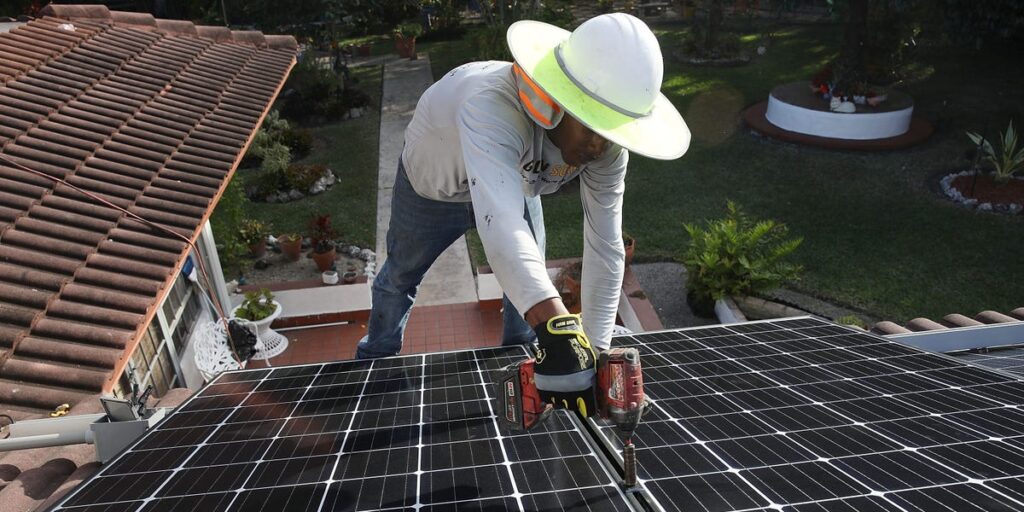- Billions of dollars in subsidies for more efficient appliances and rooftop solar remain frozen.
- Some states said they can’t access rebates and grants that were set to be doled out to homeowners.
- Proponents say energy-efficient appliances and rooftop solar align with Trump’s agenda to cut costs.
Many states still can’t access hundreds of millions of dollars awarded for federal energy rebates and rooftop solar programs.
The freeze means some contractors in Arizona who have installed home rooftop solar and energy-efficient appliances are waiting to get paid for their work. In Colorado, state officials are delaying hiring more employees to implement the programs.
The confusion seems to be over President Donald Trump’s executive orders to pause and revise climate programs as well as his short-lived federal spending freeze. Some $8 billion in rebates for energy-efficient appliances and retrofits, and another $7 billion for rooftop solar — set to be rolled out this year and authorized by the Inflation Reduction Act — are on the line.
Advocacy and trade groups said some states have been able to tap the money, but there is no clear pattern or communication from the Trump administration.
“There is absolutely no blue-red pattern, no geographical pattern. It is completely random,” David Terry, president of the National Association of State Energy Officials, said. “We’re awaiting that clarification from the administration so states can plan and move forward.”
Proponents of the subsidies — including state officials and consumer advocacy groups — said they align with Trump’s promise on the campaign trail to lower Americans’ energy bills. Retrofitting homes with energy-efficient heating and cooling systems or rooftop solar is expensive up front but can save people money in the long run, they said. And lower-income homeowners and landlords who otherwise couldn’t afford the upgrades were the target recipients.
Trump’s energy policy has focused on boosting oil and gas drilling to drive down energy costs. Oil executives and economists say that won’t happen anytime soon. In addition, potential tariffs on Canada and Mexico could hike gas prices across the country.
“These energy rebates will have real household impacts, not to mention the jobs they will create for contractors and electricians who have to do the work,” Xavier Boatright, the Sierra Club’s deputy legislative director for clean energy and electrification, told Business Insider. “Many red states like my home state of South Carolina have energy costs at an all-time high.”
DOE didn’t respond to a request for comment. In a court filing on February 9, attorneys for the Trump administration said that the department expects to resume issuing payments for home energy rebates. The filing doesn’t mention the rooftop solar program.
The filing is part of a lawsuit that nearly two dozen states, including Arizona and Colorado, brought against the Trump administration’s spending freeze. US District Judge John J. McConnell Jr. ordered the administration to immediately restore and resume funding on February 10.
Frozen accounts for energy rebates and rooftop solar
DOE’s Home Energy Rebates are divided into two categories. One offers point-of-sale discounts on heat pumps, electric stoves, insulation, and new breaker boxes and wiring — capped at $14,000 per household.
They are targeted at low- and moderate-income homeowners. Landlords who rent to people in those income brackets are also eligible. The other category helps cut the costs of larger energy efficiency projects that slash home energy use by at least 20%.
EPA’s Solar for All program similarly funds rooftop solar in low- to moderate-income communities across states.
Shayla Powell, a spokesperson for the agency, didn’t comment on the specific status of Solar for All.<
Powell said that as of February 7, the EPA had worked to ensure all accounts with IRA funding were accessible in accordance with court orders.
But, several states told Business Insider they still can’t access the funds. Arizona and Colorado are among the 11 states and the District of Columbia that launched their energy rebate and rooftop solar programs before Trump’s inauguration.
Arizona was awarded more than $300 million in total. Adrianna Amato, a spokesperson for Arizona’s Office of Resiliency, said in an email that the energy rebates are being processed and a vendor is building a list of qualified contractors completing work in homes that need to be paid.
“We have more than 1,000 applications in review for eligibility,” Amato said on February 12. “When we go into the payment system, we are able to submit for reimbursement to draw down funds that have been spent, but we have not received our reimbursements for about two weeks. We only see a status statement that says it’s pending agency review.”
Will Tool, executive director of Colorado’s Energy Office, said the state was similarly awarded nearly $300 million for energy rebates and rooftop solar projects.
Colorado had planned to roll out the rebates to the public early this year and was about to hire some employees to implement the solar program. The efforts are currently on hold.
“Our low- and moderate-income Coloradans would benefit from reduced energy costs, increased comfort, and reductions in pollution,” Tool said. “We really do not understand why the Trump administration would want to freeze these programs in Colorado and across the country.”


